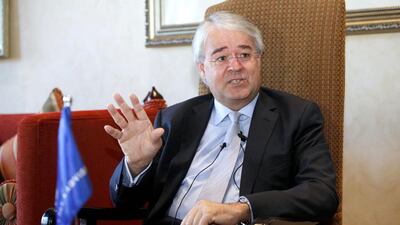Michael Andrew, KPMG International’s global chairman since October 2011, visited Abu Dhabi last week as the professional services consultancy celebrates its 40th anniversary of doing business in the UAE. KPMG, which offers auditing and tax advice services, is focusing on emerging and frontier markets that offer the prospect of outsized growth.
Why did you decide to set up in Hong Kong when you were appointed the chairman of KPMG in 2011?
The decision to move to Hong Kong was taken by the board, which wanted to get our strategy and business plan in the high-growth emerging markets right. I had previous experience opening offices in Eastern Europe and writing our first Asia-Pacific strategy. I was then the Asia-Pacific chairman and they asked me to take on a global role. And I decided that Hong Kong would be the right base. Why? My primary focus is China, India, Asia, then in descending order, Africa, Middle East. The thing I hadn’t anticipated was the amount of interest to talk to me in New York, London, Frankfurt or Paris about what I am seeing because I am on the ground. I am much more able to give them insights on what’s happening.
What percentage of your business comes from the Middle East and how are you growing here?
I would say about 3 per cent. It doesn't sound much, but one of my decisions was to put the Middle East on our global board. So I put Jamal Fakhro, who is the managing partner of our Bahrain and Qatar offices, on our global board to represent an important sub-region. We've had quite an aggressive hiring programme here, and as I speak, what I've done is to look at five lateral hires coming into this marketplace. We've relocated our global head of the centre of excellence for oil from Russia to pursue the large oil majors. We've also set up our global centre of excellence in Islamic finance here. We are targeting a growth rate here of between 15 and 20 per cent per year and I would be disappointed if we didn't get that. That's the highest after India and Africa where we are targeting 20 to 25 per cent. China is more in the 10 per cent to 15 per cent category.
What opportunities are there for Abu Dhabi in today’s global economy?
There’s a good opportunity for Abu Dhabi because if I am in the middle I can intermediate trade flows from Asia and provide trade finance, project finance, facilitating cross-border capital flows. These markets are relatively underbanked, and as a result of the euro crisis, most of the European banks have shrunk their balance sheets, and taken capital out of those markets. There’s a great space for people who can intermediate new trade flows.
Are there any countries left for you to beat a new path in?
It’s difficult to see new countries that we can open in. Basically we’re in most of the African countries and South American countries. We’re in 156 countries. We actually opened in Libya and Iraq. Libya, we opened nine months ago and Iraq about 18 months ago, and I think we’re opening our second office in Iraq as we speak. In Africa this year I’ve opened in Guinea. I have opened Myanmar this year after trade sanctions were lifted and Mongolia the year before that. The frontier countries are the ones that are left. There are only trade sanctions preventing us from doing things in other countries. You think about North Korea, you think about Cuba but at the moment there’s really nothing else.
mkassem@thenational.ae

